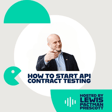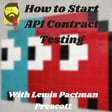Become a Creator today!Start creating today - Share your story with the world!
Start for free
00:00:00
00:00:01

Hiring testers with Jack Cole
Had a great chat with Jack about hiring testers, in demand skills and much more.
Jack from WeDo has been recruiting in this space for a long time and now is organiser of Technology Leadership Forum
Transcript
Introduction and Jack's Busy Schedule
00:00:00
Speaker
So welcome, Jack, and thank you very much for coming on the podcast. Lewis, thanks for having me on. Third time lucky. So, yeah, glad we're here today. Yeah, exactly. There's a lot. It's been busy.
Jack's Recruitment Experience and Pandemic Expansion
00:00:13
Speaker
So, yeah, just give everyone a little introduction to yourself. How long have you been hiring and recruiting in this space? Yeah, cool. So I've been in the world of recruitment for like 13 years, but 10 of those years.
00:00:27
Speaker
10-11 of those years has been in the quality assurance and test space, predominantly recruiting. Initially London, but as COVID taught us the world of remote working, I guess my client portfolio has expanded beyond the realms of the southeast of the UK and now recruiting quite a bit across the UK and now eventually into Europe in some areas too.
00:00:52
Speaker
Cool. Yeah. I mean, that's a long time. It's longer than I've been in testing myself. So you can go back, uh, further than I can. I started out about eight years ago, uh, coming off for graduate scheme and got in through there.
Lewis's Journey from Psychology to Testing
00:01:09
Speaker
I did a psychology degree, so I have no engineering background. Just yeah, stumbled upon a company, um, who gave me the opportunity.
00:01:18
Speaker
And here today now hiring, hiring testers. So, uh, yeah, it's a bit of a change. Cool.
Contract Testing Growth and Component Integration
00:01:27
Speaker
And then, yeah, so few, few months ago now, um, you put out a, a LinkedIn post, which specifically calling out like what areas within testing, uh, people are looking for and which areas potentially people could to find gaps in the market.
00:01:46
Speaker
So yeah, I just want to kind of take you back to that and see, dig deeper into it. So there was specifically a comment relevant to this podcast. So contract testing is growing into bond, but few having experience in that area. So I just wanted to hear your own words around that. I better watch what I post in the future, I think is probably what I've learned from that.
00:02:16
Speaker
No, so it's an interesting statement. I think that the, we're in a very different market now to what we were in last year. And I've seen a different, like a significant shift in the demand for that contract testing experience, certainly in like the last like six months. Last year, we started to see a definite demand and increase for people with that contrast testing experience. Those specifically, those who are like testers that
00:02:42
Speaker
I guess, focus less on end-to-end tests and focus more on that component integration, the mocking, the contract tests. I guess that you've got more stable foundations to mitigate, hopefully, issues in production. I think that too many businesses, the conversations they're having is product owners, delivery managers, they're finding issues in production.
00:03:06
Speaker
And the guess of the role of quality engineers is then having conversations with those people being like, look, if we take our head out the clouds a little bit here and focus more on the testing effort here at that unit component integration contract test layer, it should hopefully mitigate these things happening in production. And I feel like that's a lot of the conversations that QAs are having to have, particularly with the client portfolio that I work with. Now, that might just be the fact that I've engineered my career to work with a certain type of organization that
00:03:35
Speaker
value that type of testing effort. So I can only maybe give you one side of the coin. However, it has started to become an increase in demand for that particular skill set. I've seen a less of a demand in that skill set in the last six months. Now I don't know if that's just because of, I don't know if that's just down to the fact that the market's been a little bit turbulent, everyone's buried down the hatches, or the fact that actually there's limited talent out there and people stopped asking for it on the job descriptions.
Talent Shortage in Contract Testing
00:04:04
Speaker
I do have some stats to back up that statement, however, because yeah, I thought I'd do a little bit of like investigation. So first, obviously as recruiters, LinkedIn is potentially like the most powerful, like insightful tool that we have available to us. So these statistics are purely backed off of like LinkedIn. So in the backend search functionality, you can essentially search for, I think about 28 different like variations of like, you know, keyword searches, like locations and what have you.
00:04:33
Speaker
So putting in just like keywords around packed or packed IO within like keywords associated around like QA test or quality, but also including words like agile software. So they then removes people outside of, I think there's something called packed within the manufacturing industry to remove those individuals. You've actually only got 918 people in the UK that has that specific experience of which
00:05:00
Speaker
215 of those are active and open to work at the moment. So I decided to go like a step further and just investigate, well, at what point of people's careers are they gaining this skill set? And it seems to be that year seven to year 14 is where a majority of that talent pool sits. So 336 of those people between that seven to 14 year period is where that skill set sits.
00:05:29
Speaker
And then if I then took it another step further again, the average 10 year of those people is between one and three years experience. So I guess like, what does that tell us? Well, I guess that that tells us that those people are probably permanent employees or potentially good contractors that get long lasting contracts. I think it's more probable that is perm over contract.
00:05:57
Speaker
And I think that it potentially tells us that anyone who's looking to hire someone with that contract-packed experience, then they've probably got a tough time on their hands to acquire that skillset. It's a shallow pool and the average tenure being one to three years. So if someone's just joined a business, then they could be there for potentially up to another two years before they think about moving on. So that's how I interpret that data. It'd be good to get your view on it, actually, Lewis.
00:06:25
Speaker
Yeah, that's really interesting. And I think, yeah, what you were saying about the years of experience of people having it, I think that is something that we've spoken about before in the podcast, where it's the learning curve is steep for it. So I think people don't approach it until they're more comfortable with it.
00:06:47
Speaker
And people often come from a API integration testing experience first, and then they move into it. So yeah, I think definitely that relates with what my experience is with it as well. And yeah, it's really interesting to hear obviously the pool is so low because that's what I'm trying to do with this podcast is make people more aware of it and kind of bring more people into the area to break down those barriers of entry.
00:07:17
Speaker
So yeah, I think it definitely aligns with my thinking. And yeah, really, really interesting to hear that from a stats perspective for sure.
Major Companies in Contract Testing
00:07:27
Speaker
Yeah. And like I looked into the businesses that own this level of talent pool and the businesses that I'd say own a majority of that talent pool are Matillion, Booking.com, ATM revenue and customs, equal experts, Sky, HSBC, Lloyd's Banking Group,
00:07:46
Speaker
And I think it was IBM were the largest owners of that particular skill set. I think Skye being the largest out of all of those incumbents, which I thought was quite interesting because they're very different businesses from obviously media through to financial services, through to then obviously government. So I thought that there might be potentially some trends there, but
00:08:11
Speaker
you know, it seems to be like the larger, I guess, enterprise-y type businesses that obviously have higher levels of integration being like the same between all of them, which then would obviously make sense, so. Yeah, yeah, yeah. The use case definitely is for that kind of large distributed teams where you've got lots of integration points potentially across multiple development teams and sites. I think that's where the use case really holds.
00:08:40
Speaker
But on the smaller scale, it's definitely achievable as well. And I think in terms of, yeah, scaling, scaling your testing, contract testing is something you definitely want to look at.
Complexities and Adoption of Contract Testing
00:08:51
Speaker
And any other comments around that? I'd be interested again, your view there is, you mentioned obviously like that, like learning curve is steep and that's right. You know, probably someone at that like seven year mark would be indicative of that because they've reached a level of maturity within their career.
00:09:10
Speaker
If you were new to packed contract testing experience, like how quickly would you expect someone to get comfortable with that in your personal opinion? Yeah, I think contract testing's a complicated one because it does involve multiple teams and often multiple languages. So I think it's one of those things where it's not just a case of I can follow this blog article and then I can roll it out.
00:09:39
Speaker
Yeah, you've got to get other people bought into the process. And also because the tests live right next to the code base, there is that element of either you need to have access to the code base where the actual integration code lives, or you need to be comfortable at that level, that unit kind of unit test level, which the actual writing the tests is not
00:10:10
Speaker
that different is not different at all, really, to creating an integration test. It's just having that visibility, having that access, and also having that collaboration with developers. I think that's one of the entry-level areas. But yeah, in terms of answering your question about getting up to speed, once you've broken down those barriers, you can do that very quickly.
00:10:38
Speaker
And then it's just a case of getting the infrastructure in place, the other area where you need somewhere to store the contracts. So either you spin up one yourself or you have to get a software as a service, a SaaS product to do that for you. So yeah, it's just a case of infrastructure involved, developer involvement, and also a mindset shift of, okay,
00:11:08
Speaker
I'm the one that needs to write a test for a service that I'm integrating with rather than I need to write tests for the service that I'm building myself. So it's just, again, that mindset shift, which can be difficult for people to kind of understand. But yeah, once you're in, it can be a quick acceleration to understanding and being able to implement it. It's just all of that, all of that stuff that I mentioned before. Nice. Thanks for that,
Importance of Coding Principles for Testers
00:11:37
Speaker
dude.
00:11:37
Speaker
And then you also spoke about testers, QAs, quality engineers, focusing on learning the tools. And it's one of the bugbears in mind doing hiring as well, without learning the kind of core practices and principles. So yeah, how, how's that coming up? Yeah, I'll caveat what I'm about to say, saying that this isn't necessarily my own opinion. I've never wrote a line of code in my life. However, you know, when, when you've had like this conversation time and time and time again with
00:12:07
Speaker
decision makers, people I respect in there in the industry, then becomes a bit of a theme. So, you know, when you then got the mass telling you like this, this, this type of stuff, yeah, I've obviously then got to obviously then start promoting that within my own community because yeah, it seems to be like a disconnect. So I think a lot of testers just focus on, I think some of my managers actually call them tool junkies, just just focus on the tool rather than actually just like the coding practices and the principles itself. So understanding like the principles of like,
00:12:36
Speaker
UI automation and the principles of API testing and like the principles of, I guess, like the coding, like languages, like itself, rather than, yeah, I guess, like just focus on the tools. I find that actually the people that understand those principles really well around coding, they've coded in Java, they normally pretty good and they understand the principles really well. They're normally pretty quicker than picking up a secondary and a third language thereafter. And then they're pretty quick to pick it up the tools.
00:13:04
Speaker
I think it was Paul Gerard I was actually having a conversation with around like, um, I think the last time he checked there, there was about 1,900 different tools in the testers toolkit now. Yeah. Like I'm sure that that's probably evolved since then because it seems like there's just something being released daily weekly. It's impossible to then get it like to grips with all of those tools. So I guess like.
00:13:27
Speaker
It's a bit like being a mechanic, really, isn't it? It's like knowing the right tool for the right job. But if you've got the principles of how to change a tire on one car, the principles probably then remain the same for changing the car on probably a Formula One car. Now, I'm no expert in that. But when a lot of people are telling me this type of stuff, then there's got to be some level of truth towards being said. And I think, again, focus on
00:13:53
Speaker
I guess like not just like independent UI level test, just trying to make sure that you've got the breadth of like the test pyramid. So you know how to test the UI, the API, the integration, the microservices layer. I think that the test is to have that breadth of knowledge across all those different layers and the principles around it. They're the people that seem to get the jobs quickest and seem to add the most value to organizations. Amazing. Top tips. And yeah, from, from my perspective as a hiring manager,
00:14:23
Speaker
I care much more about someone choosing the right tool for the right job. And you can tell that at the interview process, when you ask someone to solve a problem that is outside of the usual day to day. And what I mean by that is someone who has to reference documentation and look at the best practices guide. Someone that does that, you can tell that they can do that in any framework, in any tool.
00:14:53
Speaker
because they can go to the root, right? And then someone that can solve the problem that they are having via research, via debugging can do that, whatever. So yeah, I think exactly what you're saying is like learning the foundations and not even just the foundations, but how to problem solve your issues is
00:15:20
Speaker
is a much, much stronger attribute to have, uh, when you're, when you're looking for a role. Yeah. No, I agree. I think that, you know, obviously I'm, I'm involved in trying to like coach people through technical tests. And I think, you know, that like problem solving ability to show you a logic and approach to solving the solution, you know, not necessarily need to get it right and up and running. Yeah. But I think if you don't show as long as you show like your logic and approach to the solution is correct.
00:15:49
Speaker
whether it passes or fails, managers are more likely to take on that person because the logic is there. Cool. And you mentioned poor Gerard, which I think leads on to some of the stuff that you've got coming up, some of the stuff you're working on.
Relaunching Networking Events and AI's Impact
00:16:06
Speaker
So yeah, tell us all about it. Yeah. So, uh, I was introduced to Paul maybe like five years ago.
00:16:14
Speaker
It's definitely pre-pandemic. So via a chat called Mike Jared. And there was an event called the Technology Leadership Forum. Mike invited me to come down and check it out because there was a good level of like networking, a good level of community that was, I guess, close to what I was doing, you know, with recruiting for a qualitative answer test professionals.
00:16:34
Speaker
And yeah, for that initial first meeting, I then become like a sponsor. I spoke at the event and used to go to on a regular basis. COVID happened. And then, yeah, I guess I in-person meetups stopped for, you know, a period of time. Paul then, I guess like approached me or Mike approached me then, you know, in partnership with, with Paul to say, look, would you be interested in, you know, re-bringing this back to life? I'm working on something else for the industry. I don't know if I've got the like time needed to, to bring it back to life and
00:17:04
Speaker
I've obviously got the network there to offer it. So I gladly took that off his hands. And we're now in the process of essentially relaunching that event. So we've been busy surveying a lot of people within our respective communities. People have come to the events before, people have come to the other events I ran previously. And what's been really refreshing is the demand for in-person networking events. We've had over 200 people respond and out of that survey,
00:17:33
Speaker
You know, we were then trying to depict what is on people's minds. I think with the adoption of, or the mass adoption of, of AI or being on the cusp of that and automation, I think that there is, you know, a conversation to be had around like how AI could impact the delivery of software and testing. So I reached out to my network and yeah, we're fortunate enough that I've managed to find a CTO who he's, you know,
00:17:59
Speaker
run like multiple AI startups. Um, he's the ex director of data science for AIG and he's going to be facilitating the discussion around, you know, that subject, um, of how AI could impact the delivery of software and testing. So less of a test management meetup and actually more designed for those that have that strategic influence across the software delivery lifecycle who are responsible for quality to essentially come together and network, collaborate and debate about topic specific views within the industry.
00:18:27
Speaker
So I guess with quality being everyone's responsibility, what should be everyone's responsibility, that gives you an open invite for data leaders, engineering leaders, QA leaders, delivery leaders, DevOps leaders to come together as that cross-functional leadership event. So yeah, I'm really looking forward to getting the first one hosted and that will hopefully become a series that we run every quarter. We've got about a hundred people that we can host for. So far we've got about 40 or so people like confirmed
00:18:55
Speaker
So yeah, anyone who's listening that might be interested in that, give me a shout and yeah, we can maybe have a conversation. Well, we'll wrap things up there, Jack, but thank you so much for coming on the podcast and yeah, good luck with everything that you're doing. No worries. Thanks for having me, Lewis. Yeah, appreciate it.











